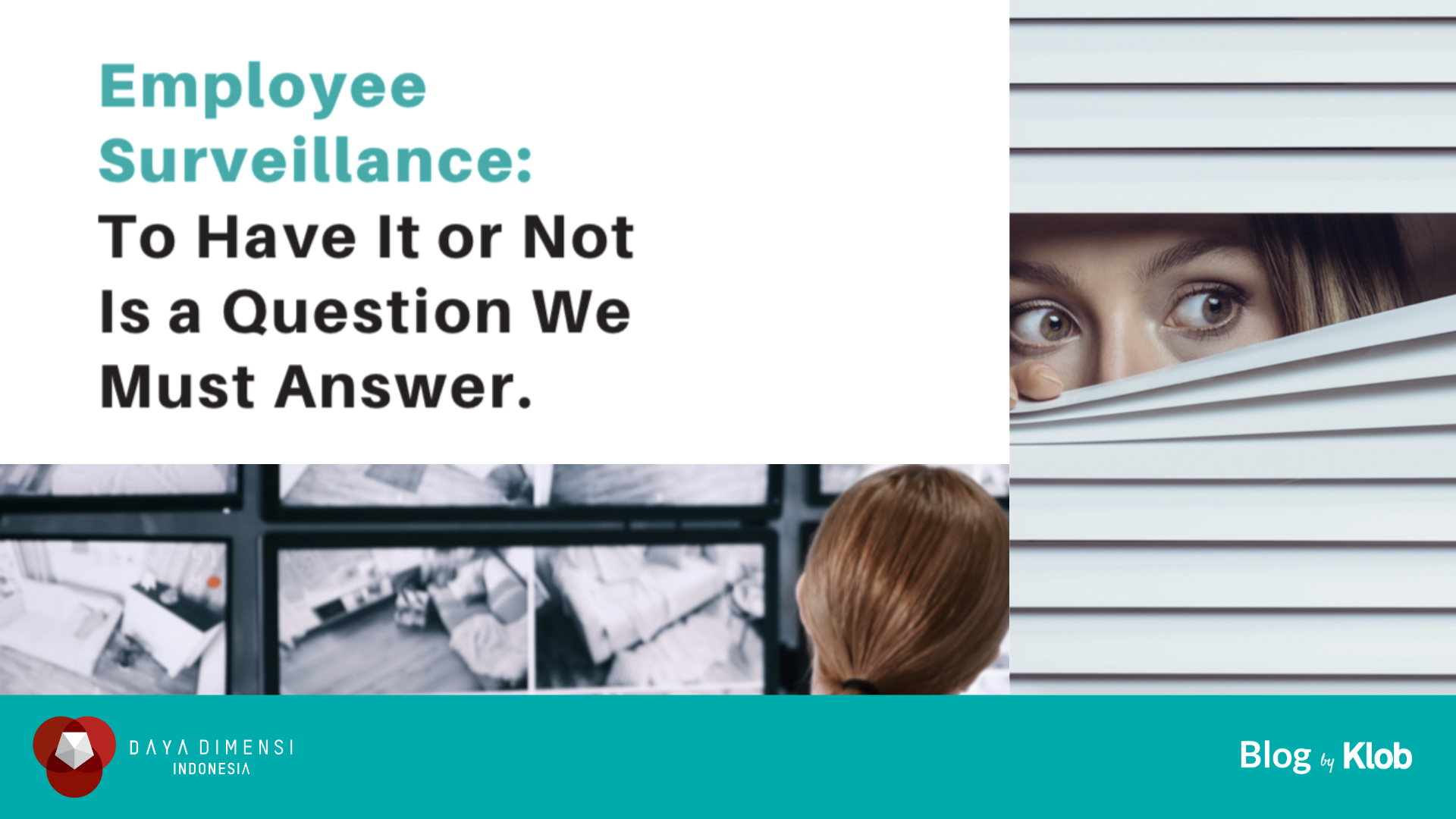
Employee Surveillance: To Have It or Not?
Employee Surveillance: To Have It or Not Is a Question We Must Answer

Digital monitoring, done by companies to observe their employees’ communication and web browser history, is not a new phenomenon for both employees and their employers as it has gone on for so long since years ago. However, it has become even more common for employers to monitor their employees since the pandemic has forced employees to work remotely from home, and employers could not directly monitor them like they usually do when working in the office. Even now, when the pandemic has ceased, many employees are still working from home or shifting to hybrid working, and companies have to adapt to this situation when monitoring their employees.
An analysis of data done by Top10VPN shows that the demand for employee monitoring or surveillance software increased by 80% in March 2020 (compared to the previous year’s monthly average), and this is the same month that the government declared the global pandemic, the lockdown was imposed, and employees were asked to work from home. The same survey also shows that this demand has been 65% higher on average since the start of 2022 than in 2019 and went even higher, reaching 75%, during the first quarter of this year.
–
With a demand that has increased significantly, it is no surprise that many different surveys done by various platforms discover that many companies have monitored or plan to monitor their employees’ activities. 70% of 7,600 global companies surveyed by VMWare stated that they either have already implemented employee monitoring or surveillance or are planning to implement it. Another survey by Digital.com on 1,250 U.S. employers found that 60% of them are using employee monitoring software, and 17% are considering doing it as well, while a survey done by ExpressVPN with Pollfish discovered that 78% of 2,000 surveyed employers are monitoring their employees.
These companies, which have implemented employee monitoring or surveillance, are doing this activity for a reason. Most of them monitor their employees to ensure that they are still working productively even at home and that they are not using their work devices for something personal and unproductive. For example, a social media marketing company based in Florida had installed monitoring software on their employees’ work computers.
This software would then take screenshots of the desktop every ten minutes and is also able to record how much time they spend on different activities using the computer. The company later analyzes the data collected through this process to determine the employees’ productivity levels and also helps the company to identify the employees that do not follow the workplace’s regulations. Some other companies, however, have very different motives. They found that monitoring their employees will help them better understand their employees’ activity and wellbeing or secure and protect sensitive data that their employees hold.
–
As companies have their own and different motives to monitor their employees, monitoring software offers different abilities that would be able to cater to their needs and motives. According to Top10VPN, monitoring software can record almost everything employees do on their computer, from webcam to random screenshot monitoring. Other most common abilities that are offered include:
- Software monitoring
- Remote control takeover which allows an employer to access their workers’ devices and remotely take over all functionality
- Keystroke logging so employers could view every click, touch of the keyboard, and conversation of their employees
- Screen monitoring
- Internet monitoring/filtering Call tapping
- Location tracking
- Webcam surveillance Audio recording
- Email and instant message monitoring, which could be considered creepy in some way, allows employers to monitor their team’s private messages on popular social media chat platforms, and even on encrypted platforms
- Time tracking
Some of these software abilities would raise goosebumps and make people wonder whether it is legal for companies to do this. While rules around employee monitoring vary from country to country, it is usually legal for employers to monitor their employees. In the US, the Electronic Communications Privacy Act (ECPA) allows employers to monitor activities on company-owned devices without alerting workers. However, some states, such as Delaware, Connecticut, and New York, have introduced rules that require companies to notify their employees when monitoring their email and other communications. In Europe, the General Data Protection Regulation (GDPR) allows companies to monitor employee communications in certain circumstances but requires that workers are notified and fully aware that monitoring takes place.
–
In the UK, no data privacy law specifically deals with whether or how employers can monitor employees. In Canada, especially Quebec, British Columbia, and Alberta, employers must be transparent about their personal information collection practices. According to CTV News, Ontario became the country’s first province requiring companies with more than 25 employees to disclose if and how they are being monitored electronically. While in Indonesia, Article 26, Paragraph 1 of Law on Information and Electronic Transactions stated that the use of any information through electronic media concerning a person’s data must be carried out with the consent of the person concerned.
Although most companies monitor their employees based without the intention to harm their employees and are legal to do so, many have commented that employers should not normalize this.
Moreover, some companies do not even notify their employees regarding the ongoing monitoring or surveillance. About a quarter of employees that VMWare surveyed reported that they are not aware whether their organization has implemented monitoring software on their devices, while about 14% of U.S. employers that were surveyed by Digital.com stated the same thing. ExpressVPN and Pollfish’s Survey revealed an even more shocking fact, where 53% of employees do not know that their employers are actively monitoring them. These results have further proven that the implementation of employee surveillance technology raises privacy concerns, which become worse when employees are working from home due to the pandemic (Blumenfeld et al., 2020).
–
Thus, some employees have spoken out about their discomfort with being monitored by their employers. ExpressVPN with Pollfish revealed that 59% of respondents feel stressed and anxious about their employer surveilling their online activity. The same survey reported that 43% say it’s a violation of trust, 28% say it makes them feel unappreciated, while 26% say it makes them resent their employers. Even more alarming, 54% of respondents said they would likely quit if their employers implemented employee monitoring or surveillance.
This statement is supported by the result of VMWare’s survey that reported that about 39% of companies that have already implemented device monitoring are seeing a significant increase in their employee turnover. A study by Holt et al. (2017) found that active employee monitoring significantly reduces perceptions of an organization’s ethics and participants’ likelihood to accept or be satisfied with a position at the company.
–
While there has been a high level of dissatisfaction among employees at the prospect of being monitored by their employer, companies believe that this is a necessary measure that needs to be done, and some have proven that it actually increases their employees’ productivity— about 81% of employers surveyed by Digital.com report an increase in employee productivity after implementing the software. Thus, when used correctly, employee monitoring or surveillance can boost performance and improve overall wellbeing.
Another thing that needs to be noted by employers when monitoring their employees, ensuring that it would only bring positive impacts, is that it is essential to disclose the fact that the employees are being monitored. These might make them feel awkward, but it’s worth it in the long run. A failure to do so could cause the employee to feel their privacy has been invaded without consent, and they could lose trust in their employer. Not only that they need to notify their employees, but they also have to ensure that their employees are okay with this decision. (OCY)
“Even more than a culture of fear, it can create a culture of mistrust. This lack of trust makes everything more difficult for the organisation to get work done.”
Brian Kropp, Gartner’s group vice-president and chief of HR research on BBC “The employee surveillance that fuels worker distrust”
Read the last article by Daya Dimensi Indonesia here.




